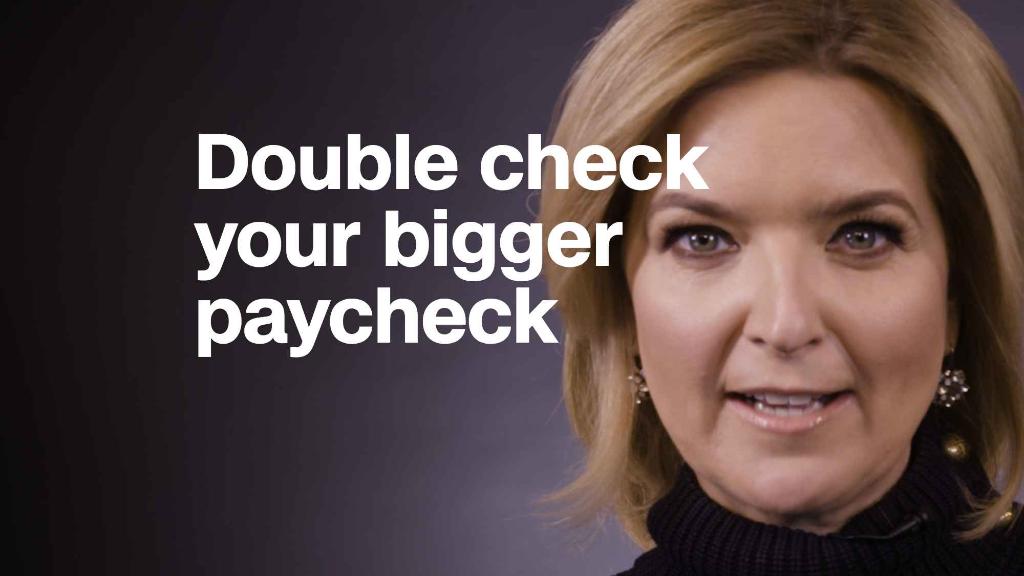
When the new federal income tax cuts went into effect at the beginning of the year, the White House said 90% of workers should see more in their take-home pay.
But a majority of CNNMoney readers said they aren't really feeling the difference in their paychecks.
Of the 550 readers who responded to a questionnaire, nearly 60% said they either aren't seeing any extra take-home pay, or if they are, it's too small to improve their financial well-being.
Another 11% said their take-home pay went up by between $100 and $199 per paycheck or per month, while another 9% reported getting between $200 and $1,000 extra.
Those who reported getting extra money most commonly said they were using it for everything from buying gas and food to saving to paying bills and paying down debt. Several people noted the increase they saw was offset by higher prices and higher health care premiums.
A number of people, meanwhile, said they saw a couple of hundred dollars more in their after-tax pay around mid-February. But they decided to have their employer withhold that extra amount so they don't end up owing money to the IRS when they file their 2018 tax returns next year.
Here's a closer look at how seven people perceive the impact of the tax cuts on their financial situation. Their incomes range from $30,000 to $260,000.
Not enough to make a difference
Warehouse production manager Mark Stanley is underwhelmed by the effect of the tax cuts on in his paycheck. They amount to an extra $20 every two weeks.
"I can afford to go to the movies ... by myself," said Stanley, who lives in Hobart, Indiana. "It doesn't make a difference at all."
Larry Bankovich, a vice president of a trucking and logistics company near Pittsburgh, expressed a similar sentiment. Bankovich is getting an extra $60 every two weeks.
"Not much it can help," he said in response to a question about how he's using the extra money.
Related: Yes, you can still deduct interest on your home equity loan
Another reader, a police captain in Milwaukee, said neither she nor her husband have seen any extra money in their paychecks.
She doesn't know if she'll benefit from other changes to the tax code when she files her 2018 tax return next year. Those include a nearly doubled standard deduction and a higher child tax credit for their two kids who still require after-school care. But she said that she had expected to see something more in her paycheck now.
Retiree James Starkweather and his wife, who live in Cape Coral, Florida, get income from a pension, Social Security and an IRA. He figures they're seeing about $6.50 extra in his pension check every month.
That won't go far. "I can go to McDonald's and get a happy meal," Starkweather said.

Some very welcome extra cash
Sharon Vice, a CPA in Florida whose husband owns his own business, was among those who expect to benefit from the tax changes. She figures that for the year, their federal income tax bill will be lower by about $7,000.
Vice attributed the drop to three things: The reduced income tax rates, the expanded child tax credit, and the new 20% deduction for small businesses, partnerships, and other so-called passthrough entities.
When asked how they might use the extra money, she said, "Our savings with tax reform will help provide for our family. The savings from the new [business] deduction will enable my husband to put a little more in retirement. We haven't been able to put away as much as I feel we should because of three teenagers!"
Giving the 'extra' back for fear of 'nasty' surprise next year
Matt Fadiman is a banking executive in Maine. He and his wife, who also works, have kids at home and they bring in wage, business and investment income.
Fadiman says that between them they were getting an additional $300 every two weeks. But he then decided to have that money withheld instead to avoid an unwelcome burden next year.
Using the IRS paycheck withholding calculator and others, he estimates that if he doesn't have that money withheld, he could be hit with a big bill when he files his 2018 taxes next April. In addition, he expects he'll owe more than he did last year because the new tax law eliminated some deductions he usually takes and limits others, in particular capping his state and local tax deduction at $10,000.
Related: Is your paycheck being taxed enough? Check the new IRS calculator
"It's been characterized as an across-the-board tax cut. In my particular case it won't be and it may be a tax increase," Fadiman says. "Many others may find they're being underwithheld and have a nasty surprise next April."
Sharon Leon of California finds herself in a similar situation. She and her husband are both working in retirement and draw an income from their jobs and their pensions.
As a property manager, Leon said she was getting an additional $300 per paycheck this year. But she's banking all of it to pay her 2018 taxes, since her accountant calculated she and her husband will now owe $2,200 more than they did last year.
The state and local deduction cap is a big reason why since the people most heavily hit by it live in high-tax states like California and New York.
"It's a fraudulent assumption that you can spend the extra money in your paycheck. We can't," Leon said.
